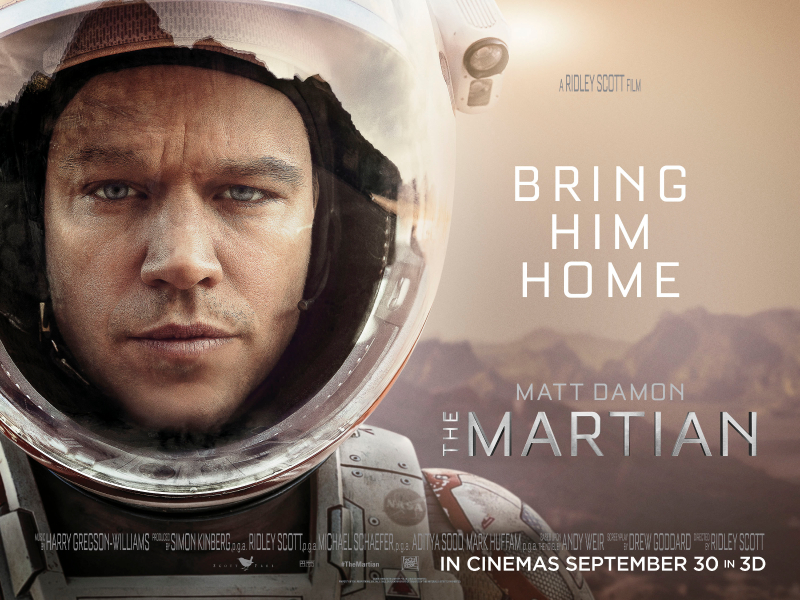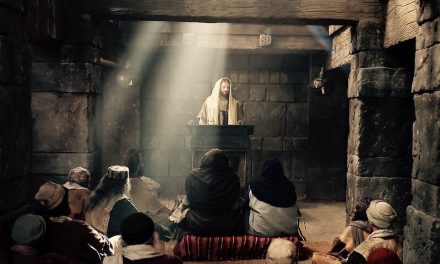This post is part of the series “Virtue Ethics at the Movies.” You can read the introduction to the series here.
When I first heard about The Martian, it was pitched as “like the movie Cast Away, with Tom Hanks, except on Mars.” This description did not make me want to see the movie. How interesting could watching one, isolated person’s struggle be, even if it was on Mars? Because I really love science-fiction, I saw it anyway. It turned out not to be a story of the lonely individual but one of a courageous world.
Spoilers Ahead.
The movie starts with the crew of the Ares III, a manned mission to Mars, being forced to do an emergency evacuation of the planet because of a dust storm. On the way to the escape vehicle, Mark Watney (who is played by Matt Damon) is struck by debris, presumed dead, and left behind.
Watney survives but just barely. He has an antenna sticking out of him and his suit is leaking air. He is able to make it back the Hab, the evacuated crew’s living quarters, remove the antenna, stitch himself up, and get his bearings. He realizes he has to figure out how to live for four years until Ares IV arrives, the next manned mission to Mars, but only has food for about 300 days.
This sets up the first half of the movie. It is one of Watney solving survival problem after survival problem. The movie focuses on his food: potatoes. Watney, the botanist of the expedition, comes up with several ingenious solutions that enable him to produce crops and live. He hauls Martian soil into the Hab to convert half of the space into a garden. He fertilizes it using his feces. He makes water by “Take hydrogen. Add oxygen. Burn.” He uses the potatoes intended for their Thanksgiving Dinner as seed. His crops start to come up.
Throughout these perpetual threats to his existence, Watney jokes. When his first crops come up, he says, “I don’t want to come off as arrogant here, but I’m the greatest botanist on this planet.” And, then, “They say once you grow crops somewhere, you have officially colonized it. So, technically, I colonized Mars. In your face, Neil Armstrong!” And, “Mars will come to fear my botany powers.”
We too easily dismiss humor as trivial or trivializing, facilely equating criticism with intelligence. Yet, laughter, a joke, can raise people’s spirit, make the heart a little more generous, let in hope, and generate new creative possibilities. At its best, it fosters courage by enabling people to face genuine threats and still do what is needed. And Watney clearly knows his situation,
At some point, everything’s gonna go south on you… everything’s going to go south and you’re going to say, this is it. This is how I end. Now you can either accept that, or you can get to work. That’s all it is. You just begin. You do the math. You solve one problem… and you solve the next one… and then the next. And if you solve enough problems, you get to come home.
Yet, even with this courage, it is not enough to save Watney. The challenges are too steep, the circumstances too adverse, and everything does go south. Watney needs others to be saved, others who are willing to take risks to do so. This sets up the second half of the film.
Watney recovers the Pathfinder rover to establish communication with NASA. Through satellites, NASA’s Vincent Kapoor and Mindy Park realized that Watney is alive. Now, with the establishment of communication, everyone at NASA starts working on a way to bring Watney home before the four year mark and his food runs out.
These endeavors include a rushed launch of additional supplies that fails, a high risk plan than is officially nixed but secretly transmitted to the crew returning from Mars. The crew mutinies to carry it out, and, the Chinese space program pitches in to make it all possible. Moment after moment, people chose to do what is good rather than what is safe and secure.
And these people are diverse. They come from different cultures, have different levels of power at their work place, and are beholden to different constituencies. Yet, they each have needed insights and capabilities and can help if they are willing to risk their careers and ambitions to do so. In the movie, they do make these choices. It is a vision of a whole community that is courageous: willing to do what they believe is right and good, to save a life, despite the risks and challenges.
Being a theologian, I could not help but see this as the way the church as the body of Christ should function: each person with their unique gifts, united in love, sacrificing for the sake of each other, in hopes of salvation. It is what humanity can be when it is not driven by fear but by love. The Martian compellingly depicts this courageous world and so puts forward what Christians claim is at the heart of humanity,
Every human being has a basic instinct: to help each other out. If a hiker gets lost in the mountains, people will coordinate a search. If a train crashes, people will line up to give blood. If an earthquake levels a city, people all over the world will send emergency supplies. This is so fundamentally human that it’s found in every culture without exception. Yes, there are assholes who just don’t care, but they’re massively outnumbered by the people who do.





Trackbacks/Pingbacks